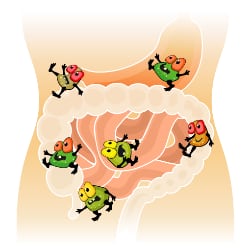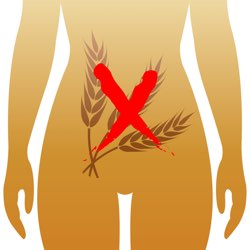 Food Syndromes
Food Syndromes
Food Syndromes

-
Main Ideas
Learning Objective
Understand how food can cause health-related symptoms by affecting the immune system.
Behavioral Objective
Identify and eliminate foods that may be negatively affecting your health.
Key Thought
The immune system tells us how to keep healthy, we just have to listen.
-
Main Ideas
Learning Objective
Understand how food can cause health-related symptoms by affecting the immune system.
Behavioral Objective
Identify and eliminate foods that may be negatively affecting your health.
Key Thought
The immune system tells us how to keep healthy, we just have to listen.
-
Terms
- Acquired Immunity
- noun
A type of immunity that develops when a person's immune system responds to a foreign substance or microorganism, or that occurs after a person receives antibodies from another source. The two types of acquired immunity are adaptive and passive.
- Celiac Disease
- noun
Also called celiac sprue or gluten-sensitive enteropathy, is an immune reaction to eating gluten, a protein found in wheat, barley and rye. If you have celiac disease, eating gluten triggers an immune response in your small intestine.
- Gluten
- noun
A substance present in cereal grains, especially wheat, that is responsible for the elastic texture of dough. A mixture of two proteins, it causes illness in people with celiac disease.
- Gluten Sensitivity
- noun
Non-celiac gluten sensitivity (NCGS) manifests itself with non-specific symptoms that occur both intestinally and extra-intestinally and resemble the symptoms of celiac disease or wheat allergy.
- Immune System
- noun
A complex network of cells, tissues, organs, and the substances they make that helps the body fight infections and other diseases.
- Inflammation
- noun
A localized physical condition in which part of the body becomes reddened, swollen, hot, and often painful, especially as a reaction to injury or infection.
- Innate Immunity
- noun
Innate, or nonspecific, immunity is the defense system with which you were born. It protects you against all antigens.
- Syndrome
- noun
A group of symptoms which consistently occur together, or a condition characterized by a set of associated symptoms.
-
Terms
- Acquired Immunity
- noun
A type of immunity that develops when a person's immune system responds to a foreign substance or microorganism, or that occurs after a person receives antibodies from another source. The two types of acquired immunity are adaptive and passive.
- Celiac Disease
- noun
Also called celiac sprue or gluten-sensitive enteropathy, is an immune reaction to eating gluten, a protein found in wheat, barley and rye. If you have celiac disease, eating gluten triggers an immune response in your small intestine.
- Gluten
- noun
A substance present in cereal grains, especially wheat, that is responsible for the elastic texture of dough. A mixture of two proteins, it causes illness in people with celiac disease.
- Gluten Sensitivity
- noun
Non-celiac gluten sensitivity (NCGS) manifests itself with non-specific symptoms that occur both intestinally and extra-intestinally and resemble the symptoms of celiac disease or wheat allergy.
- Immune System
- noun
A complex network of cells, tissues, organs, and the substances they make that helps the body fight infections and other diseases.
- Inflammation
- noun
A localized physical condition in which part of the body becomes reddened, swollen, hot, and often painful, especially as a reaction to injury or infection.
- Innate Immunity
- noun
Innate, or nonspecific, immunity is the defense system with which you were born. It protects you against all antigens.
- Syndrome
- noun
A group of symptoms which consistently occur together, or a condition characterized by a set of associated symptoms.
Introduction
Your immune system is one of the many causes of food syndromes. If you eat something you are allergic to, your immune system automatically responds by identifying substances in the food as harmful.
To understand how food syndromes occur, we need to dive deep into the function of the immune system. We'll take a look at the innate immune system and the adaptive immune system and the role of each in keeping your body healthy.
Types of Food Syndromes
Different foods trigger reactions in our bodies. We are all affected differently by the compounds in our foods, and some people are more sensitive than others. This is for a diverse range of reasons which we'll go into later in the article.
It should be noted that gastritis is not a food syndrome as it is usually caused by certain medications or excessive alcohol consumption. Here we are looking specifically at conditions caused by food.
These are the most common types of food diseases that affect the population:
Food Allergies
First on our list of issues caused by food is allergies. Food allergies affect about 10.8% of the adult population and manifest in various severities.
Eight main foods cause allergic reactions in people. These are milk, soy, fish, shellfish, gluten, wheat, peanuts, and tree nuts.
Severe food allergies cause symptoms such as swollen airways, hives, itching, abdominal pain, vomiting, lightheadedness, fainting, and trouble breathing.
In extreme cases, people can develop anaphylaxis (constriction and tightening of the airways) which may cause them to stop breathing and lose consciousness. If not treated by medical staff, anaphylaxis can cause coma or death.
Food allergies come from the adaptive side of your immune system.
Food Intolerances
The difference between food intolerance and a food allergy is that you may be able to eat a small amount of the irritant food without a reaction when you have an intolerance.
On the other hand, if you have an allergy, even the smallest amount of the food can start to cause your body to react.
Intolerances cause similar reactions to allergies, such as cramping, nausea, bloating, and diarrhea. If you have an intolerance, you won't go into anaphylactic shock.
Sometimes, intolerances aren't necessarily caused by the proteins in the food itself, but rather ingredients used in its preparation.
Pollen Allergy Syndrome
Some foods, such as fruits and nuts, can cause an allergic reaction for those who have hay fever. The proteins found in these foods cause a reaction as they are similar to pollens that cause allergic reactions.
If you have a reaction to a food containing pollen-like proteins, you may suffer from itching of the mouth and swelling of the throat. In severe cases, pollen allergies can cause anaphylaxis.
Celiac Disease
A genetic autoimmune disease; Celiac disease, is linked to eating gluten. It causes people with the disease's immune system to attack its own tissues. This damages your small intestine and inhibits your ability to absorb nutrients.
What Happens in the Body When Celiacs Eat Gluten?
Every protein is made of the building blocks of small amino acids. When we digest any protein, the body will attempt to take that protein - say, from meat - and break it down into its individual amino acids. We can use those amino acids to build our own proteins in our own bodies.
In the case of people with celiac disease, gluten is a component of a plant. Our body is not capable of completely breaking this gluten down. So there're larger fragments of amino acids strung together, which makes up a smaller protein. In this case, gliadin is the protein component that triggers the problem in those susceptible.
Symptoms of Celiac Disease
Symptoms of celiac disease include vomiting, diarrhea, weight loss, fatigue, abdominal pain, rashes, psoriasis, smelly feces, constipation, and bloating. Prolonged suffering from the illness can cause vitamin deficiency, iron deficiency, and low bone density.
Gluten is in wheat, barley, and rye. If you are diagnosed with celiac disease, you should avoid all foods containing these proteins.
Celiac disease is not routinely tested for and can develop at any age. If you suffer from any of the symptoms mentioned, you should check with your doctor. It's not celiac disease. If you continue to eat food products that contain gluten when you have celiac disease, it can cause long-term complications.
Two million people in the United States have celiac disease. The condition is also hereditary, so you are more likely to develop it if a close family member suffers from celiac.
People with type-1 diabetes, Down's syndrome, autoimmune thyroid disorder, and Turner syndrome are more likely to be at risk.
Gluten Sensitivity
A milder form of intolerance to gluten is non-celiac gluten sensitivity. You experience similar symptoms that are less severe than the symptoms of celiac disease.
One of the most common symptoms of gluten sensitivity is brain fog, which affects as many as 40% of gluten intolerance sufferers. The reason for this is relatively unstudied but is thought to be a reaction to antibodies in the gluten. Brain fog causes forgetfulness, fatigue, and difficulty thinking.
Other symptoms include fatigue, anxiety, bloating, diarrhea, gassiness, stomach issues, constipation, and pain in the abdomen. Gluten intolerance may also cause severe headaches or migraines.
Gluten sensitivity is also associated with causing neurological changes that may lead to anxiety, depression, and in extreme cases, psychosis and schizophrenia.
If you aren't sure if you have a gluten sensitivity but suffer from some of the above symptoms, try eliminating gluten from your diet to see if it improves your symptoms. If not, speak to your doctor about having a celiac test.
Migraines
Did you know that it isn't just your gut that can be affected by food syndromes, but your mind too? For example, severe migraines have been linked to eating foods that someone has developed IgG (Immunoglobulin G) resistance to.
Cyclic Vomiting
Not to be confused with eating disorders, cyclic vomiting is a relatively unexplained disorder.
Cyclic vomiting is a series of vomiting episodes that occur with no apparent explanation. They can occur for hours or days and appear without warning or any other prior symptoms.
For people who suffer from cyclic vomiting, episodes of vomiting start at the same time of day (most commonly morning) and always last for a similar amount of time.
It can be hard to diagnose cyclic vomiting as vomiting is a symptom of many other ailments. However, if you regularly vomit without explanation and are otherwise in good health, you could suffer from the condition.
Many triggers can bring on cyclic vomiting episodes, from stress to exhaustion, excitement, menstruation, or motion. Certain foods can trigger outbreaks of cyclic vomiting. These foods are cheese, chocolate, caffeine, and alcohol.
Both children and adults can be affected by cyclic vomiting, but most commonly, children between the ages of 2 and 6 suffer from it.
Crohn's Disease
Another illness that affects the gut is Crohn's disease. This disease causes inflammation of the bowel. It has similar symptoms to celiac disease, which can make it hard to diagnose.
Although not brought on by food, this illness causes issues with your digestion and ability to absorb nutrients.
Autism
There have even been some studies that suggest diet can have an effect on autistic children.
The innate immune system, or the cellular immune system, creates activity against food proteins. Research showed that the bacterial toxin present in the gut called lipopolysaccharide triggered dramatically more inflammation in autistic children.
The Immune System and Food Syndromes
The immune system is a complex system that keeps your body safe from harm, fights germs, and stops foreign substances from attacking your cells.
There are two parts to the immune system: the innate immune system and the adaptive immune system. Although they both work together, they serve different purposes.
Before we can understand how the immune system impacts food syndromes, let's take a closer look at the two parts of the immune system.
What Is the Innate Immune System?
The innate immune system comprises the cellular immune cells we are born with. It is the body's primary defense against foreign organisms and toxic substances.
Whatever the germ or foreign substance is trying to enter the body, the innate immune system responds in the same way. For this reason, it is called the 'nonspecific immune system.'
So-called 'scavenger cells' detect an infection and react quickly. These cells can destroy bacteria in the space of a few hours.
Nine different active enzymes make up the innate immune system. They each have a different role in eliminating foreign organisms from the body. Each protein has a different role, and they trigger one another to determine the actions required by the cells.
The innate immune system comprises your skin (the first barrier of defense) and your mucous membranes.
If bacteria get past your skin or mucous membranes, the innate immune system activates specific cells to fight the bacteria. These cells identify and eradicate the foreign substance.
How Does the Innate Immune System Work?
One of the most common ways your innate immune system fights infection is by causing inflammation. We would usually associate inflammation as a negative response by the body, but that's only chronic inflammation.
We need inflammation for:
- Healing and repair
- The metabolic processes of defense
Inflammation is the cells of the immune system working together to fight infection. That's why a wound becomes red and inflamed before it heals.
Some food syndromes occur because the immune system incorrectly identifies proteins from foods as invading bacteria. It begins to attack the protein and results in food syndrome symptoms.
What Is the Adaptive Immune System?
If the innate immune system cannot destroy cells that have been targeted for destruction, the adaptive immune system takes over.
The adaptive immune system takes longer to react but has more accuracy than the innate immune system. The specialized immune system is responsible for memorizing the bacteria that cause an illness and thus stops you from contracting the disease again.
The specialized immune system comprises the antibodies in your blood, T lymphocytes, and B lymphocytes.
What Are the Antibodies Produced by the Adaptive Immune System?
Your antibodies are in your blood and attach to toxins that enter the body to neutralize them. They also have the ability to activate the proteins required to fight the bacteria that enter the body.
Your bone marrow produces your lymphocytes, which have various roles in the adaptive immune system. From detecting infected cells to acting as the memory for how to fight future infection. The lymphocyte cells produce antibodies in your blood.
What Causes Food Syndromes?
There are varying degrees of severity of food syndromes, and each case should be analyzed individually.
Understanding what causes food syndromes can be challenging to determine as so many variables come into play. Even detecting which food syndrome affects you can be hard to diagnose.
If you suffer from symptoms that could be due to a particular food, speak to your doctor.
Here's a breakdown of some of the typical food syndrome causes.
Genetics
Celiac disease can occur when someone has variants of the genes HLA-DQA1 and HLA-DQB1.
These genes are part of the HLA complex. This complex is responsible for the immune system differentiating between invading proteins from bacteria or viruses and the body's own proteins.
For those with celiac disease, these genes activate the immune response when the protein from gluten (gliadin) enters the body. The activation causes inappropriate inflammation that causes celiac disease.
Not everyone with these genes will develop celiac disease (only about 3%). However, everyone who has celiac disease has a variation of these genes.
The inheritance pattern of these genes is unknown, but people who have parents or siblings with the disease are more likely to develop it.
Genetics and Gluten Intolerance
Genetics isn't a cause of gluten intolerance. The route causes of gluten intolerance are still relatively unknown. However, it is known that people with gluten intolerance don't have the abnormal gene that those with celiac disease have.
Gluten intolerance is a much more common food syndrome than celiac disease. People with gluten intolerance can't correctly absorb carbohydrates, and they ferment in their gut.
Other studies suggest that people who can't absorb wheat correctly have a problem with the lining of their digestive tract. The intestinal mucosal barrier function is compromised, which causes bacteria to leave the gut and go into the bloodstream. This, in turn, causes inflammation in the body which leads to the symptoms.
Genetics and Crohn's Disease
Another disease linked to hereditary factors, you are more at risk of Crohn's if you have a family member with the condition.
Although the cause of Crohn's is still unknown, genes and the immune system are believed to play an integral role. There may be a virus that causes the disease and causes the immune system to attack the bacteria in the intensities (as with celiac disease).
Environment
Your environment can also play a role in your susceptibility to developing food syndromes. For example, children who are not introduced to allergens at a young age are more likely to develop an intolerance to them as they get older.
Other environmental causes that can cause food allergies include, but aren't limited to air pollution, pesticides, pollution, and smoking. Prolonged exposure to air pollution can cause asthma, giving you a higher susceptibility to developing food allergies.
Maternal diet may even have an influence on the child developing an allergy after birth.
The way your foods are processed and farmed can also impact the way your body responds to them.
Gut Biome Imbalance
Disruption of the balance of bacteria in your gut could also leave you more prone to developing food intolerances or sensitivities. As we have established, your immune system is closely interlinked to the processes in your gut.
To ensure optimal health, you should aim to maintain the microbiome in your gut.
How Can You Solve Food Syndromes?
Some food syndromes are not fixable. However, there are certain life choices you can make to ease the severity of the symptoms. Here are some of the solutions:
Diet
Your diet has an unprecedented impact on the amount of inflammation in the body. One of the triggers of chronic disease is poor diet and lifestyle choices.
When you eat certain foods, it can trigger the innate immune system cells to increase inflammation in the body. Eliminating foods that cause elevated levels of IgG (Immunoglobulin G, the antibody that fights infection) can improve your symptoms.
To feel better both physically and mentally, you should cut out all processed foods from your diet. This will not only reduce your chances of obesity but will improve your overall wellbeing.
You should eat whole foods that are predominantly plant-based. Ensure your diet includes plenty of servings of:
- Green vegetables
- Fresh fruits
- Whole grains
- Beans, lentils, and pulses
- Nuts and seeds
If you can build your plate around healthy, plant-based protein-rich foods, you will notice a significant improvement in your wellbeing.
Not sure where to get inspiration for healthy, simple meals? Take a look at the recipes in the Supplement Relief whole-foods cookbook.
To discover which particular foods are causing you issues or affecting your wellbeing, you could keep a food diary. A food diary helps you keep track of what you're eating and how it affects your day-to-day life.
Eat different foods every day to try and find the source of your symptoms. It's called an elimination diet.
Drink Water
As part of your healthy and varied diet, you should also drink plenty of water (at least 4 pints a day).
Water is essential for all of your body's processes, and drinking enough can help flush out toxins.
Take a Probiotic
One way to ensure you maintain a healthy balance of bacteria in your gut is by taking a probiotic supplement.
The probiotics in your system are constantly at work to stop bad, harmful bacteria from entering your bloodstream. There is a strong link between balanced gut bacteria and a healthy immune system.
You can also eat fermented foods such as miso, tempeh, kimchi, and kombucha to help boost the number of good bacteria in your gut.
Boost Your Immune System Naturally
As you've discovered from this article, the immune system is a complex and intricate system. It loves it (and works optimally) when you take good care of it.
This includes getting enough sleep and ensuring you allow time for rest.
Other ways to boost your immune system include eating foods rich in antioxidants such as berries and dark leafy greens.
Add antioxidant spices such as cinnamon, turmeric, and ginger to your daily diet for an added immune booster.
Diet Has an Unprecedented Impact on Our Health
The main takeaway from this module should be that what you eat can affect just about every process in your body. Food isn't only linked to your gut and digestion.
What we eat can have an influence not only on our physical health but on our mental health, energy levels, mood, and stress. The better we can look after ourselves, the less likely we will see our bodies deteriorate as we age.
Successful aging can be defined as maintaining throughout your life health and productivity. This can lead to what we might call graceful maturing.
There's plenty of evidence in the medical literature that natural foods and natural health products can help assist us in this graceful maturing.
To learn more about maintaining a healthy lifestyle, continue with our health education wellness lifestyle course.
Food Journal
Journal your food intake for one week. Don't worry about portion sizes, just write down what you eat throughout the day. Make any notes about how you feel (headache, extremely tired, energetic, etc). This will give you an accurate picture of how you currently eat and will help you identify areas in your diet you can start improving.
Chronic Disease Family Tree
Make a list of chronic diseases you have or that are common in your family. List any "treatments" you or a family member are currently doing for the disease. Do you think this treatment is addressing symptoms only or the root problem?
Discussion Assignment
Please share your thoughts in the Discussion Forum about what you decided, learned or experienced. We encourage you to comment on what others have shared and to ask questions.
Course Outline
![]() Session Expired from Inactivity
Session Expired from Inactivity
Do you want to?
9618 Jefferson Highway, Suite D-191
Baton Rouge LA 70809-9636
(888) 424-0032 |
support@supplementrelief.com
* Disclaimer: This page is available exclusively for SupplementRelief.com clients. None of the information on this website is intended to replace your relationship with your healthcare provider(s). Nothing should be considered medical advice. The information, knowledge, and experience shared on this website are the opinions of SupplementRelief.com. This site and its content are intended to enhance your knowledge base as YOU MAKE YOUR OWN HEALTHCARE DECISIONS in partnership with your qualified health professional.
* These statements have not been evaluated by the Food and Drug Administration. These products and services are not intended to diagnose, treat, cure, or prevent disease.
* There is NO GUARANTEE OF SPECIFIC RESULTS for the products or services offered, and the RESULTS CAN VARY for each individual. Any results claimed by our customers are based on individual experiences that are unique and cannot be guaranteed.
FirstFitness Nutrition and NuMedica may be promoted and sold on the internet ONLY by Authorized Resellers who have been approved by and have registered their website domain with these companies. They strictly prohibit, and actively monitor, the UNAUTHORIZED SALE or RESALE of their products in ALL online public shopping portals including Amazon, eBay, and others and into other countries. All products purchased in SupplementRelief.com are for PERSONAL USE ONLY and CANNOT BE RESOLD to others. Please report violations of Reseller Policy directly to FirstFitness Nutrition at 800.621.4348 and to NuMedica at 800.869.8100.
The content and photographs on this website are copyrighted or Licensed Material and may not be downloaded for other than personal use. Republication, retransmission, reproduction, or any other use of the content or photographs is prohibited. ©2010-2024 SupplementRelief.com.
Are you sure you want to remove this item?










